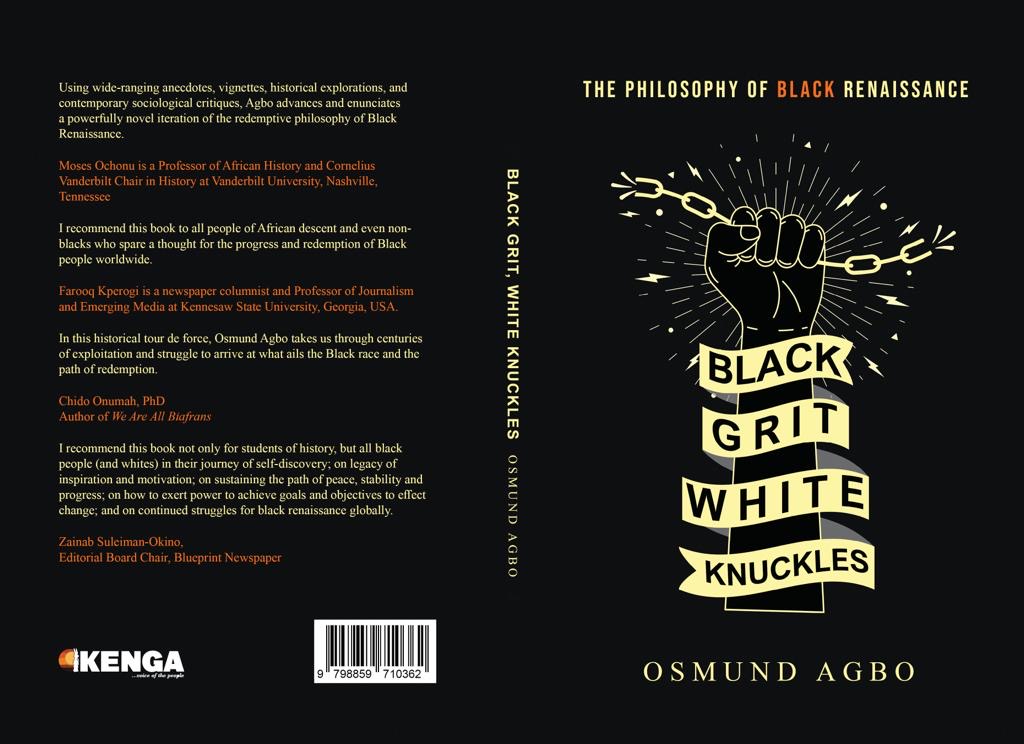I didn’t need to be a seer to know, long before this time, that Dr. Osmund Agbo would write Black Grit, White Knuckles. The thing I could not have foreseen is that the title would be this arrestingly riveting. It would be no prophetic feat too if I tell you that he would return to the theme in the future. Long before Dr. Agbo began to write this book, I felt safe to presume, I had engaged him on the subject of black destiny and could almost touch his zeal. His preoccupation with the story of black people is close to a gnawing obsession.
.
There is another catalyst. Dr. Agbo, no one disagrees, is now among the most relentless commentators on Nigerian affairs. Relentless is a little of an extraordinary word in this context. I have forgotten the thinker who called the seemingly inevitable loss of interest in Nigeria; “Commentary fatigue.” I cannot venture a better description. I had my flush of enthusiasm too, before yielding to commentary fatigue, as one would, to an ineluctable family ghost. But even after a father issues a public disclaimer, disavowing a problematic child, he does not stop to feel unsettled when suspicious noise comes floating in from the streets. This is how I feel when I read Dr. Agbo and other unwearied warriors of the pen still capably yelling at Nigeria.
Nigeria–I know you don’t like her–is nonetheless a most significant component of the black world. The consequence is that taking moral responsibility for her spills into doing so for all of Africa, like a drop of oil on a finger. Dr. Agbo’s fabulously written book is such an extension of his assumed responsibility. A field marshal, as I earlier hinted, in the struggle for the soul of Nigeria, he has now lived in the United States for nearly two decades, a commodious enclave in the western hemisphere which offers often dismaying opportunity for racial comparisons. Super added to this should be the history of the US as the center for the storied struggle for the final emancipation of the black man from the atrocious yokes of slavery and discrimination. Dr. Agbo is therefore conspicuously qualified to write this book.
.
On the imperative question of where black people should now turn, Dr. Agbo makes my arguments. Slavery was bad. Colonialism was bad. Segregation was bad. Racism is bad. Neocolonialism is bad. You name them. But what should be the best response of the black man? I hereby beg to cull, without modification, my earlier opinion on this from an article written early in 2022;
“While I deplore the evils of colonialism, Africa was not the worst example. And if we look at remoter history, every people had had to be conquered and exploited by stronger foreigners. Again, colonial crimes are inexcusable. However, any attempt to explain the failure of human conscience in Africa in the past 65 years with her colonial experience is, to be civil, the starkest nonsense.” This is what Dr. Agbo preached in his book, in a broader and more informed way.
What should we expect? “The moral arch of the universe bends towards justice,” Martin Luther King had famously said. This presupposes, on the face of it, that black people would get reparation for the monstrous injustices meted out to them which defaces much of human memory.
Dr, Agbo vehemently but respectfully disagrees with Rev. King. It is not the first time I would chance upon such brave-hearted disputation. In his wonderous book, The History of Western Philosophy, Bertrand Rusell had similarly disagreed with both Aristotle and the psalmist. Aristotle thought and wrote that “virtue” guarantees the acquisition of wealth. Upon the other hand, the psalmist had said he never saw a righteous man begging for bread. Russel held both views to be consummately absurd.
.
Dr. Agbo, from real world experiences and of course, staggering facts of history, thinks that the moral arch of the universe does not bend towards justice. Much of history, I am compelled to also agree, has been about might making right. One must not however lose sight of why Rev. King needed such highfalutin-idealism. And in the same vein, why the psalmist had to make a promise of constant supply of bread.
Dr. Agbo, in Black Grit, White Knuckles, offers practical, astute recommendations on how black people can again inhabit their space in the sun with full dignity. I am ashamed to own that that I did not know Ottaway Gurly before reading Dr. Agbo’s thought-provoking book. It is the same way it took a Carl Sagan for me to know Frederick Douglass.
Whenever a man wakes up is his morning, you should allow me this consolation. Gurley’s Black Wall Street is more than metaphorical, it is a historical experiment of the kind of unions black people should build across the world, communities inspired by deliberate but positive rivalry– we need Gurley’s communities in black countries more than we need emotion-laden Pan-Africanism. I didn’t set out with this review to douse all curiosity. I will stop here. Every reading African deserves to read Dr. Agbo’s perfectly unquantifiable contribution to the unfinished work of fully asserting the humanity of the black race.
































